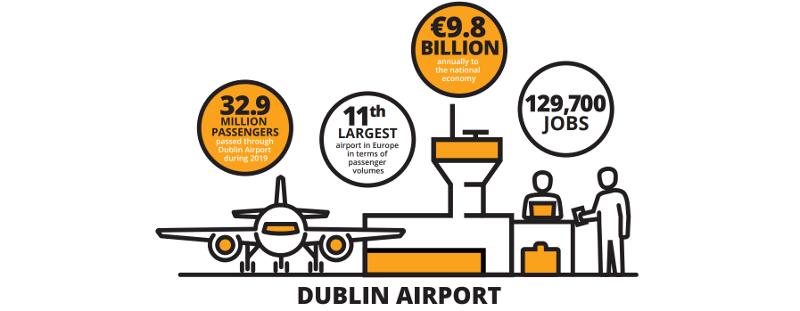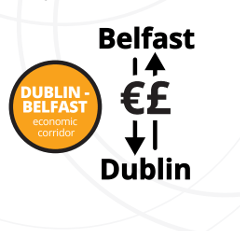Theme 4: Employment, Economy & Dublin Airport
Introduction
Fingal’s strategic location within the Eastern and Midlands Regional Assembly (EMRA), as part of the Dublin City Region and within the Dublin-Belfast Economic Corridor place it in a very good position from an economic perspective. Fingal has major economic assets, including Dublin Airport, proximity to Dublin City & the Dublin Port Tunnel, including direct access to the national and regional road and rail transport networks in Ireland and excellent links to Europe by air and sea. Fingal has one of the youngest, highly educated and most diverse populations in the state. Employment in the county increased by 15% between 2011 and 2016. There are 4,574 hectares of land zoned for employment, industry and enterprise uses throughout the county. The labour force participation rate in Fingal is the highest in the region at 66.9% compared to the state average of 61.4%. In 2016, 89.7% (133,971) of the labour force resident in Fingal were employed. In addition, factors such as excellent schools, outstanding natural, cultural and sporting amenities, the wide range of leisure and shopping opportunities, a scenic coastline, seaside villages and a rural hinterland make Fingal a uniquely attractive place to visit, live, work and do business in.

Background and Context
Business demography in Fingal is characterised by a small number of very large employers and a high volume of SMEs. The top 25 employers in the county only represent 0.3% of all businesses in Fingal but represent 17.9% of all employees. 98% of businesses in Fingal are classed as SMEs which employ 109,000 people in the county. Fingal is home to a diverse range of employers, varying in scale from major multi-national companies, Irish small and medium enterprises (SMEs) and Fingal based start-ups with small numbers of employees. Foreign Direct Investment (FDI) and indigenous industry play important roles in the county’s economy. Fingal has a number of significant clusters within the county and is home to some of the leading names in the technology, life sciences and pharmaceutical sectors. (Fingal Dublin Chamber). There was a total of 8,311 businesses registered in Fingal in 2018 (Fingal Dublin Chamber). This was an increase of 29% (2,435 businesses) since 2011.

Fingal has a very strong indigenous agri-food sector cluster, with many of the key national horticulture brands based in Fingal. This is a key employment sector for rural communities. These include enterprises such as Keelings, Country Crest, Sam Dennigan, Keoghs and Donnellys. Fingal performs strongly in the Information and Communication Technology (ICT) sector, with leading companies such as IBM, PayPal and Symantec represented in the Blanchardstown area. The Pharmaceutical/ Healthcare sector is well established in Fingal by companies such as Bristol Myers-Squibb, Mallinckrodt, Mylan and MSD. The Aviation sector is a major employer in Fingal and includes Aer Lingus, Dublin Airport Authority, Cityjet, Servisair and Ryanair. The Dublin Enterprise Zone (DEZ), located in Dublin 15, adds €14.4 billion to national economic output and supports 34,600 jobs in the economy. The DEZ has developed at a national scale over the last 20 years, supported by significant public and private investment. The area currently contains 20 Business Parks with approximately 1,100 business premises. Over 19,500 jobs are supported in a mix of FDI and indigenous companies.

The Retail Sector plays a significant role in the economy of Fingal as a source of employment with regionally significant shopping centres in Blanchardstown and Swords, retail warehousing and retailers with a nationaldraw such as Ikea and Decathlon. Swords, Fingal’s County town, is identified as a Level 2 ‘Major Town Centre’ in the Retail Strategy for the Greater Dublin Area and has a well-developed retail offering which includes the Pavilions Shopping Centre and Airside Retail Park. Blanchardstown, which is designated as a Level 2 ‘Major Town Centre’ in the Retail Strategy for the Greater Dublin Area, is one of the largest and most important retail centres in the State. In smaller towns and villages, it is the Council’s policy to enhance their retail functions in proportion with the role they play in meeting the needs of the local population and smaller catchment population.
Tourism is an important indigenous sector in Fingal, in terms of generating revenue and employment. Visitors to Fingal normally generate a €500 million spend, which sustains a total of 20,000 jobs (one in four jobs in Fingal) across all sectors (transport, retail, entertainment and other services) (Fingal Tourism Strategy 2015-2018. Fingal has a rich portfolio of natural and cultural assets and capitalises on its city-edge location leveraging its proximity to Dublin City and excellent transport links, in particular Dublin Airport. Rural tourism, which includes fishing, forestry, trekking, equine and farm-based activities, provides opportunities for the diversification of the rural economy. Fingal has 88 km of coastline stretching from Sutton to Balbriggan. Greenway development is a strategic priority for Fingal County Council. The county is home to a number of historic houses, demesnes and gardens, including Malahide Castle and Demesne, Newbridge House and Demesne and Ardgillen Castle and Demesne. As well as heritage attractions such as Swords Castle, Bremore Castle, Luttrellstown Castle, Skerries Mills, the Seamus Ennis Centre, Dunsink Observatory and numerous monuments such as the Martello Towers along the coast and Round Towers and other buildings and sites of archaeological significance throughout the county. Fingal has a strong reputation as a producer of good quality food as well as an excellent offering in a range of restaurants and local artisan food products.

Dublin Airport
Dublin Airport’s strategic location provides access to national and international markets making Fingal an attractive location for business to locate. Dublin Airport is nationally significant due to its employment base, passenger throughput and air freight services and it remains the primary economic hub in Fingal. With 233 thousand flights arriving and departing from 177 destinations via 46 airlines, Dublin Airport welcomed a total of 32.9 million passengers during 2019, making it the airport’s busiest year on record. Dublin Airport is a major employment cluster and a strategic business location nationally as well as being the single most significant economic entity in Fingal and the wider Dublin City region. Dublin Airport is of vital importance to the Irish economy and acts as the principal international gateway for trade, inward investment and tourism.
Dublin Airport plays a significant role in terms of employment generation, efficient functioning of the wider regional economy and the ability of Ireland as a whole to travel and trade with the rest of the world. Dublin Airport is a key economic engine for Ireland bringing additional jobs and tourism spending throughout the island. The latest estimates of employment and Gross Value Added (GVA) associated with the airport denotes it as a major employment cluster and a strategic business location nationally. Dublin Airport supports 129,700 jobs and contributes €9.8 billion annually to the national economy. 21,500 of these jobs result from direct employment supported by ongoing operations at Dublin Airport, with the total GVA generated directly by the airport estimated to be over €1.8 billion.
The airport is a primary contributor to Ireland having one of the highest connectivity levels on the continent relative to the size of its population and economy. In terms of connectivity, Dublin Airport has been the second fastest growing airport among major European airports over the last five years (InterVISTAS – Dublin Airport Economic Impact Study 2019).
This connectivity is critical to the economic development of Ireland, including trade, tourism, FDI and business location decisions. More than any other business or economic driver, Dublin Airport and its ongoing growth generates significant benefit for the County of Fingal, allowing for a diverse local economy to flourish. Since March 2020 and the onset of the Covid-19 pandemic there has been a devastating impact on air travel around the world and Dublin Airport is no exception. Passenger throughput at Dublin Airport contracted from 6.7 million in Q1 2020 to just 156,000 in Q2 as international travel restrictions severely disrupted numbers travelling (Dublin Economic Monitor, September 2020).
Achievements since the Previous Development Plan:
There are a number of employment generating land use zonings in the Development Plan that can facilitate business, enterprise and job creation over the Plan period. These zonings, ranging from general employment to high technology, heavy industry, metro economic corridor, warehousing and distribution, food park and rural business, allow for enterprise and employment growth opportunities across the various economic sectors.
There have been a number of major job announcements in Fingal since the adoption of the Development Plan 2017 - 2023, e.g. MSD new biotech facility in Swords will create 350 jobs in 2021. In July 2018, a €503,000 cash injection was announced by the Fingal Local Enterprise Office (LEO) through a number of its grant schemes aimed at supporting 47 small and start-up businesses.
Fingal County Council has paid out €7.53m to 1,542 businesses in the Fingal area for the Restart Grant in 2020 which provided direct grant aid to micro and small businesses to help them with the costs associated with either staying open or reopening and reemploying workers following COVID-19 closures.
Funding has been granted under the Urban Regeneration Development Fund for two significant projects – Sustainable Swords and Our Balbriggan Rejuvenation Plan.
Fingal County Council launched the Fingal Skills Strategy in 2019, the first of its kind to be developed by any Local Authority in Ireland and it identifies gaps between the skills of Fingal’s workforce and the skills that employers need. Fingal sees the strategy as a roadmap for future skills development and a model of best practice. Fingal is the fastest-growing Local Authority area in the country, and so the creation of sustainable jobs is a key focus.
The Fingal In It Together Charter to promote businesses in Fingal and stimulate the local economy including promotion and marketing of local business and measures to assist businesses in reopening as public health restrictions eased such as the Parklet Partners Initiative and a Shopfront Improvement Grant Scheme.
Town & Village Renewal Schemes in eligible towns and villages in the county funding improvement projects such as village and green open space enhancements.
Community Enhancement Programme, Place-making and Events funding for improvements to community buildings, town open spaces and local events throughout the county.
The planning for MetroLink is ongoing between FCC and TII and it is set to commence passenger services in 2027, which will carry up to 50 million passengers per annum, and run between Swords and Charlemont, connecting key destinations including Dublin Airport and the City Centre.
Clustering has been a key policy concept in the Fingal Development Plan and has resulted in a number of successful clusters throughout the county, namely; the ICT sector in Blanchardstown, the Pharmaceutical/ Healthcare sectors in both the Swords area and in the Blanchardstown/ Mulhuddart area, the Aviation sector in proximity to Dublin Airport, and the Agri-Food sector in rural locations principally to the north of the County.
 The Masterplan lands at Barrysparks & Crowscastle (2019) will accommodate a mixed-use commercial and residential development that will grow into a key economic cluster both for Swords and the Greater Dublin Area. The strategic employment land bank at this location will play a key role, accommodating up to c. 180,00 sq.m of commercial space and c. 14,500-15,500 additional jobs over a period of 20 years, and providing for c. 700-750 new residential units.
The Masterplan lands at Barrysparks & Crowscastle (2019) will accommodate a mixed-use commercial and residential development that will grow into a key economic cluster both for Swords and the Greater Dublin Area. The strategic employment land bank at this location will play a key role, accommodating up to c. 180,00 sq.m of commercial space and c. 14,500-15,500 additional jobs over a period of 20 years, and providing for c. 700-750 new residential units.
The integrity of the Dublin – Belfast/M1 Economic Corridor and the Metro Economic Corridor continues to be protected so that it can act as a catalyst for future economic and physical development.
Fingal County Council has provided 3 Enterprise Centres, including coworking suitable for SMEs and start-up companies and freelancers, with particular emphasis on ensuring their provision within large schemes to offer opportunities associated with clustering and networking.
The Council is actively working on the Sutton to Malahide Greenway, the Royal Canal Greenway, the Rush to Lusk Cycleway, the Skerries to Balbriggan Cycleway, the Donabate to Skerries cycleway and the Broadmeadow Way. The Baldoyle to Portmarnock section of the Fingal Coastal Way opened in early 2020. Planning permission has been received for the Broadmeadow Way and is to commence in 2021.

The Dublin Airport Local Area Plan was adopted in 2019 and this provides an updated strategy for the continued growth of Dublin Airport in line with relevant aviation, planning and environmental policy within the context of a sustainable growth framework. The Dublin Airport Central Masterplan 2016 produced a framework for the development of office floorspace of 41,677 sq.m. (phase 1), which is near completion and within Phase 2 of 33,787 sq.m. of office floorspace, which will be the subject of a full traffic impact assessment.
The implementation of the Fingal Statement of Tourism Strategy including the marketing of Fingal as a visitor location and the engagement with local tourism groups continues across the county. Flavours of Fingal continues to grow and highlight the quality and depth of food and farming in Fingal.
Key Issues for Next Development Plan:
Fingal’s next Development Plan will be guided by the growth enablers and policies outlined in the RSES and will strive towards achieving growth that is sustainable, competitive, inclusive and resilient. The MASP identifies Strategic Residential and Employment Development Corridors within Fingal such as the Dublin Enterprise Zone, Swords and Dublin Airport/South Fingal, Lissenhall, Dunsink, Baldoyle-Stapolin and Donabate, which will create sustainable compact communities with improved housing choice, access to social and economic opportunities, enhanced services and amenities for a resident population of some 1.65m people in the metropolitan area by 2031.
Developing new clustering opportunities and rejuvenation of existing business and industrial parks, land, and buildings - to sustainably meet future demand will also be a priority of the Development Plan. Swords and Blanchardstown’s importance are reinforced in the RSES and they will continue to function as the primary centres for economic development in Fingal. The Development Plan will aim to transform our enterprise base for longer term resilience and sustainability. The rural economy will continue to be supported by the objectives and policies in the Development Plan, in conjunction with the LECP and LEO. Fingal County Council will continue to support investment, both FDI and indigenous, and work with agencies such as LEO, IDA Ireland and Enterprise Ireland to ensure the provision of high-quality jobs at the right locations. This in turn will require the provision of housing, education facilities, public transport and high-quality amenities to reduce commuting and ensure a high quality of life for the inhabitants of Fingal.
The Dublin-Belfast Economic Corridor is a key element in the delivery of the RSES. This corridor provides opportunities for further Foreign Direct Investment (FDI) and that by increasing its critical mass and population, jobs growth will take place in a sustainable growth pattern focused on clusters and smart specialisation. Considerable work has already taken place in Fingal to promote this corridor, in particular the industrial lands at Stephenstown, Balbriggan located along this corridor, and the next Development Plan will ensure that measures are provided to strengthen this area in line with the expectations of the RSES. Dublin Airport’s connectivity will continue to be critical to the economic development of Ireland, including trade, tourism, FDI and business location decisions and Fingal County Council will continue to support economic development at this strategic location.
Fingal County Council will explore opportunities for further development on Fintech, CorpTech, personalised and regenerative medicine, internet of things, artificial intelligence, cybersecurity, technology consulting, sharing economy, international education services, investment management and administration, marine energy and the circular economy. The Development Plan review will also place emphasis on building on our existing strengths in the county and seeking out new opportunities in line with the strategic actions outlined in Enterprise 2025 Renewed.
Retail and the recovery of the retail sector will be of paramount importance in the next Development Plan. Regeneration and placemaking to create a sense of identity, community with an active focus will be key factors when preparing the Development Plan in order to ensure that we create healthy and attractive places to live and work and to ensure that lands are used to their full potential. Protecting the landscape and the natural and built heritage of the county will be paramount and balancing that with tourism expansion and promotion in our rural and urban areas will be central to this. A key consideration pervading the future economic development of the county will be sustainability and Ireland’s commitments under the European Green Deal and Fingal’s Climate Change Action Plan.
KEY QUESTIONS
- How can the Development Plan promote Fingal as a uniquely attractive place where people can live, work, do business and recreate?
- How can the Development Plan support existing businesses and further economic growth throughout the County?
- How can the Development Plan ensure that the potential of our youth developed and retained within Fingal?
- Are there key sectors of the economy that you think could/should be located in Fingal?
- How can the Development Plan support regeneration of our towns and villages?
- How can the Development Plan support the new work practices that have changed considerably since Covid-19?
- How can the Development Plan support the recovery of the retail sector?
- How can the Development Plan optimize the potential of the tourism sector in Fingal?

